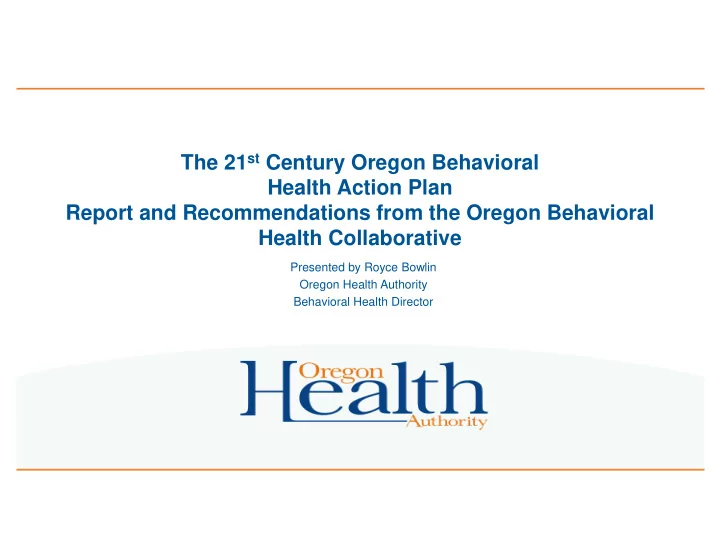

The 21 st Century Oregon Behavioral Health Action Plan Report and Recommendations from the Oregon Behavioral Health Collaborative Presented by Royce Bowlin Oregon Health Authority Behavioral Health Director
Going forward: A behavioral health system that works for all Oregonians Priorities • Improve behavioral health outcomes for consumers • Improve equitable access to effective services in every part of the state • Improve efficiency and cost-effectiveness in services • No wrong door approach • Mental health and substance services are seamlessly tied to all aspects of care • Focus on prevention and health promotion • System-wide accountability for improved outcomes 2
Oregon’s Current Behavioral Health System: • Fragmented financing, delivery systems, and services fail to serve and exacerbate poor health outcomes for children, adolescents, adults, and older adults. • Insufficient access to services at the right and place in a culturally and linguistically appropriate manner • Lacking a cohesive plan to integrate all services and treat the whole person • Poor integration between systems of criminal justice, human services, health and education • Lack of strategies to promote prevention and early education that supports wellness and addresses the Social Determinants of Health 3
Behavioral Health Collaborative: • In late 2015, Senator Sara Gelser, D-Corvallis, and Oregon Health Authority Director Lynne Saxton traveled the state to hear from adolescents, adults and families who have had difficulties accessing mental health and substance use disorder treatment in Oregon. They heard from approximately 550 consumers and family members over the course of seven town hall meetings across the state. • Created a mapping tool to highlight behavioral health services in Oregon and identify gaps. • OHA Director Saxton then convened the Behavioral Health Collaborative (BHC) in July 2016 with the goal of charting a course for excellence and sustainability in behavioral health services across systems. • Membership was determined through an application process. Expertise includes: peers, consumers, Tribal health care, public health, mental health and addiction providers, prevention, education, corrections, public safety, housing, judicial, disability services, Coordinated Care Organizations (CCOs), and Counties. • Close to 50 participants have been meeting over the past 7-months. Participants continue to be very invested and focused on making great strides to improving the experience for the individual / family. 4
Behavioral Health Collaborative Values • Focus on the consumer and their caregivers. • Emphasize prevention, health promotion and early intervention. • Address trauma, stigma, cultural and language barriers. • Provide simple, seamless, integrated services with a “no wrong door” approach. • Align provider payment with outcome goals. 5
Where we are today Four DRAFT recommendations have been developed focusing on the following areas: 1. Governance and Finance 2. Standards of Care and Competencies 3. Workforce 4. Infrastructure
Where we are today (cont.) • Collaborative continues to meet, next meeting scheduled for January 31, 2017 with the hope of finalizing recommendations. • The recommendations supported by the collaborative will be presented to Director Saxton for review and support. • Collaborative will then develop work groups to continue working on the implementation of recommendations. • About to launch the Behavioral Health Mapping Tool.
Recommend
More recommend